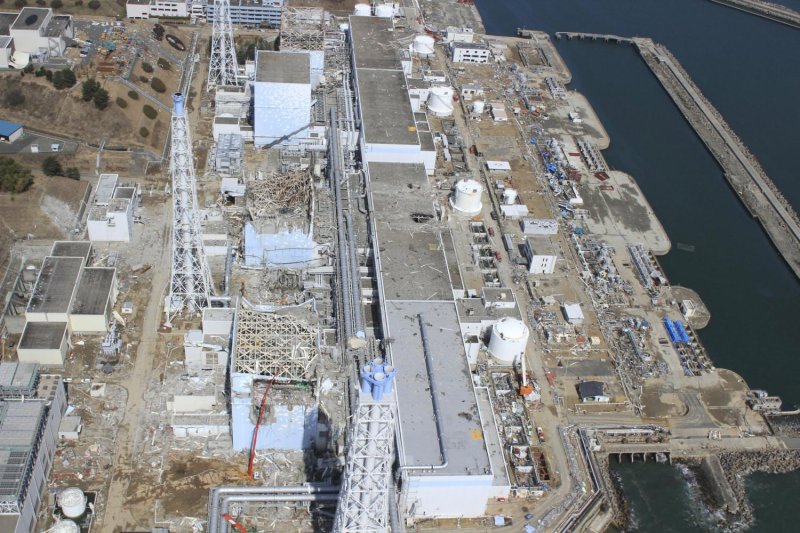The crippled Fukushima Dai-ichi nuclear power plant is seen in Okumamachi, Fukushima prefecture, northern Japan in this March 20, 2011 aerial photo taken by a small unmanned drone and released by AIR PHOTO SERVICE. From top to bottom, Unit 1 through Unit 4. UPI/Air Photo Service Co. Ltd. |
License Photo
TOKYO, July 11 (UPI) -- Comments by the head of Japan's Nuclear Regulation Authority indicate the Fukushima nuclear plant may have leaked contaminated water into the sea for two years.
"We've seen for a fact that levels of radioactivity in the seawater remain high, and contamination continues — I don't think anyone can deny that," NRA chairman Shunichi Tanaka said Wednesday at a briefing after a meeting of the authority's top regulators, The New York Times reports. "We must take action as soon as possible."
Fukushima's operator, Tokyo Electric Power Company, began to inject a sealing agent into the ground near the shore protection Monday to prevent radioactive water from leaking into the sea, The Asahi Shimbun reported.
Tanaka's statement, the Times said, confirms experts' suspicions that the Fukushima plant was still leaking radiation into the sea long after the huge initial releases after it was hit by the devastating March 2011 earthquake and tsunami.
"If there was no leak, we would see far lower levels of radioactive cesium in waters off the plant," Jota Kanda, an oceanographer at the Tokyo University of Marine Science and Technology who has examined Tepco's readings of radiation levels, told the Times last month.
Natural tidal flushing of the water in the plant's oceanfront site should have dispersed the initially released radioactivity by now, thus resulting in a rapid drop in radiation levels, Kanda said.
"This suggests that water might be leaking out from the plant through damaged pipes or drains, or other routes Tepco doesn't know about," he said. "We need to find out where exactly these leaks are, and plug them."
In April, when it was discovered that at least three of Fukushima's seven underground storage pools were seeping thousands of gallons of radioactive water into the soil, Tepco President Naomi Hirose dismissed speculation that radioactive water could be released into the sea. "That will absolutely never happen," he said.
On Tuesday, Tepco said the density of radioactive cesium in groundwater by the sea at Fukushima had increased to about 90 times more than the levels recorded on Friday, China Daily reports. The company said it did not know the reason for the sudden rise in toxicity.
Two of Japan's 50 nuclear reactors are currently in service. Last week, the NRA gave permission for those two reactors to stay online for now although they failed to meet strict new safety standards, China Daily said.
When Japan's new safety regulations on nuclear reactors went into effect Monday, four power companies applied to the NRA for the required safety evaluations to restart 10 of their nuclear reactors.
A survey by The Asahi Shimbun in June found 58 percent of Japanese respondents opposed to restarting the country's reactors.















